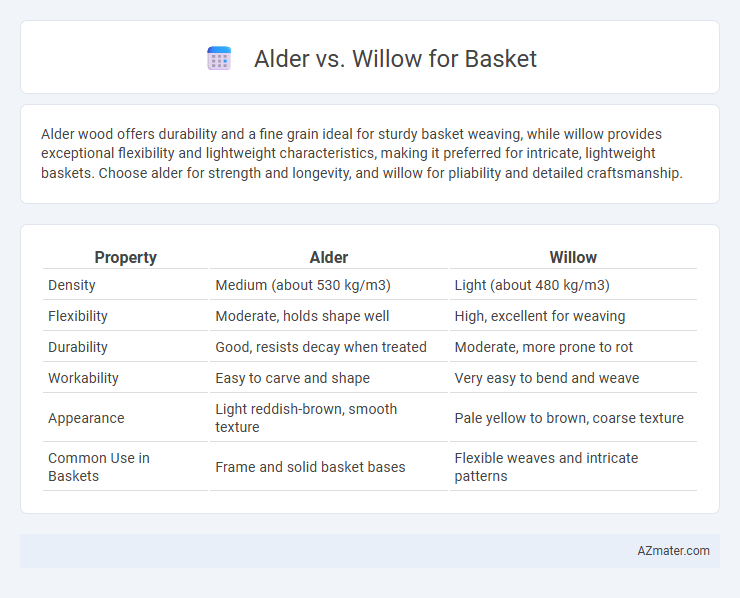Alder wood offers durability and a fine grain ideal for sturdy basket weaving, while willow provides exceptional flexibility and lightweight characteristics, making it preferred for intricate, lightweight baskets. Choose alder for strength and longevity, and willow for pliability and detailed craftsmanship.
Table of Comparison
| Property | Alder | Willow |
|---|---|---|
| Density | Medium (about 530 kg/m3) | Light (about 480 kg/m3) |
| Flexibility | Moderate, holds shape well | High, excellent for weaving |
| Durability | Good, resists decay when treated | Moderate, more prone to rot |
| Workability | Easy to carve and shape | Very easy to bend and weave |
| Appearance | Light reddish-brown, smooth texture | Pale yellow to brown, coarse texture |
| Common Use in Baskets | Frame and solid basket bases | Flexible weaves and intricate patterns |
Introduction: Alder vs Willow for Basket Weaving
Alder and willow are two popular wood choices for basket weaving due to their flexible yet durable properties. Alder wood offers a smooth texture and consistent strength, making it ideal for intricate basket designs, while willow provides exceptional pliability and rapid growth, ensuring sustainable harvesting. Basket makers often select willow for its lightweight nature and resilience, whereas alder is preferred for its fine grain and uniformity.
Botanical Profiles: Understanding Alder and Willow
Alder trees (genus Alnus) feature strong, flexible branches with a dense, straight grain ideal for basket weaving, thriving in moist, nitrogen-rich soils. Willow species (genus Salix) offer pliable, elongated shoots prized for their smooth texture and elasticity, commonly found in wetland habitats. Both trees contribute distinct bark and sap properties that influence durability and color in traditional and contemporary basketry.
Historical Use of Alder and Willow in Basketry
Alder and willow have both been integral materials in traditional basketry, with willow branches favored for their flexibility, strength, and smooth texture, allowing for intricate weaving techniques across European and Native American cultures. Alder wood, valued for its durability and resistance to moisture, has historically been used in basket-making for sturdier, utility-focused baskets, especially in Northern and Pacific Northwest indigenous communities. The distinct properties of willow and alder contributed to their specialized use, shaping the historical development of basketry practices based on environmental availability and functional requirements.
Workability: Comparing Flexibility and Strength
Alder wood offers moderate flexibility with lightweight characteristics, making it easy to shape and ideal for intricate basket weaving. Willow wood provides superior flexibility and higher tensile strength, allowing for more durable and resilient baskets that can withstand heavier loads. The combination of willow's robustness and alder's smooth workability enables artisans to select materials based on the basket's intended use and required durability.
Durability and Longevity of Alder and Willow Baskets
Alder baskets offer moderate durability with natural resistance to splitting and cracking, making them suitable for light to medium use over several years. Willow baskets exhibit superior flexibility and strength, granting them exceptional longevity and the ability to withstand heavier loads without deformation. Over time, willow baskets maintain structural integrity better than alder, resulting in longer-lasting performance for frequent use.
Harvesting and Preparation Techniques
Alder wood is favored for basket weaving due to its flexible, smooth fibers that are harvested in early spring when sap content is high, allowing easier stripping and bending. Willow is typically harvested during late winter to early spring, chosen for its long, pliable rods ideal for weaving, and requires soaking in water to enhance flexibility before preparation. Proper timing and soaking methods are crucial for both Alder and Willow to prevent breakage and ensure durable, high-quality baskets.
Aesthetic Differences: Color, Texture, and Grain
Alder wood features a warm, reddish-brown color with a smooth, uniform texture and subtle, straight grain, making it ideal for baskets requiring a refined and consistent appearance. Willow offers a lighter, creamy tone with a more coarse texture and pronounced, irregular grain patterns that lend a rustic, natural aesthetic to baskets. The color contrast between Alder's rich warmth and Willow's pale shade creates distinct visual appeal, influencing the basket's overall style and ambiance.
Environmental Considerations and Sustainability
Alder wood is sourced from fast-growing, renewable trees that thrive in wet environments, making it a sustainable choice for basket weaving due to minimal deforestation impact. Willow, often harvested from managed coppices, regenerates quickly and supports biodiversity by providing habitats for various wildlife, enhancing its environmental credentials. Both woods offer eco-friendly options, but willow's traditional harvesting practices and natural habitat support give it a slight advantage in sustainability for basket crafting.
Cost and Availability of Basket Materials
Alder wood offers an affordable and moderately durable option for basket making, widely available in North America, making it a cost-effective choice for craftsmen. Willow, known for its flexibility and lightweight properties, is generally pricier due to its specialized harvesting and limited regional availability, especially in Europe and parts of North America. Basket makers often prefer willow when durability and pliability outweigh initial material costs and accessibility concerns.
Choosing the Right Wood: Final Recommendations
Alder wood offers a fine, even grain and light color ideal for weaving flexible, lightweight baskets that require smooth finishes. Willow wood features strong, pliable branches suited for sturdy, durable baskets with natural resilience to moisture and wear. For delicate, decorative baskets, choose alder, while willow is preferable for heavy-duty, functional baskets demanding greater strength.

Infographic: Alder vs Willow for Basket
 azmater.com
azmater.com